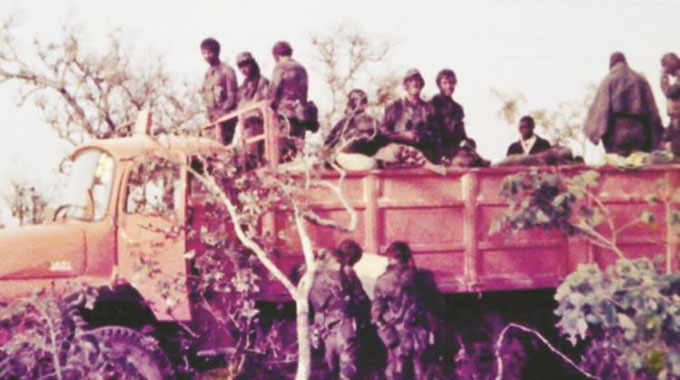Rhodesian raid . . . lest we forget

Isdore Guvamombe On Monday
It is a wintry morning. Grandmother sang melodiously, head tilted sideways, as she cleaned the homestead. She paid special attention to the delicate clay pots she had just moulded, being her main source of income.
Tonight she would treat her 10 new pots to some high temperature bonfire to harden them.
We called it firing the clay pots. After firing, she put them on the market. In fact, she had a ready market in the village and beyond.
Grandfather, was, as usual, seated on his wooden stool, polished smooth by years of use with an adze in his cultured right hand, carving another stool from hard wood. It too, had a ready market.
Groggy sounds of diesel engines heralded the arrival of a convoy of Rhodesian soldiers on the outskirts of the village.
Here, the road was not more than just a track dwarfed by high bush, where tall grass brushed against both sides of the huge military trucks as they moved tortuously in a convoy.
Then, the unrelenting ruckus of the combined thunderous roar of five high-powered engines driven in low gear, announced trouble the villagers had always expected.
The lead car suddenly broke into high speed and pulled to the centre of granny’s homestead. Others followed suit spreading to other homesteads. The soldiers beat everyone and everything, from doors, to goats, dogs, cats and people. Riot!
“Ipi lo wena gandanga?” (Where is the guerilla?), one of them spoke in Silapalapa, a colloquial language used mainly on white-owned farms.
We haplessly saw grandfather being kneed, kicked, shoved and pushed, leaving the half-finished stool he was carving stunned on shrivelled shavings.
Granny’s unfired clay pots lay broken from the heavy boots. The grass thatch on each hut was torched. There was no time to rescue property. The soldiers waited for the fire to destroy everything, at times pointing their fire sticks (the guns) at any villager who dared attempt to salvage anything.
The village was razed.
That night, after the soldiers had left, we abandoned Negomo to seek refuge in Chimufombo, at my mother’s parents.
It was a long journey on foot where we avoided many security checkpoints. Two days after arriving at Chimufombo, I resumed my Grade Two at St Edward’s Chimufombo.
By Mach, combatants from Zanla, the military wing of Zanu, had liberated a vast swathe of land in Matsvitsi communal lands, at the centre of which was St Edward’s Chimufombo Primary School.
Chimufombo was a Catholic institution led by Father Hipler, a missionary of German origin.
We were in Grade Two and mathematics was beginning to sink into my skull, especially addition and multiplication. I was among those beginning to understand the war of liberation and its values, vision and mantra.
Zanla combatants spent most of their time in classrooms, teaching subjects of their choice.
Chimufombo was the only school still open, the rest had been closed and people forced into protected villages by the Rhodesian Forces in a bid to avert contact and collaboration with freedom fighters.
Part of the political orientation for the youngsters was sloganeering, everywhere. Combatants with AK-47 assault rifles slung over their shoulders occupied themselves with teaching pupils, the future generation of Zimbabwe.
The guns were so special they were not mentioned by name. We called them fire sticks. The combatants would come into our classes and teach us. My favourite were Cde Farai Kapfupi and Cde McDuff Mandebvu. They were very humorous and humble.
In fact, in my opinion those days, they were too nice to be carrying fire sticks and killing the white man.
On my first encounter with them, I expected them to have tails and to be barbaric for Rhodesian Information Service propaganda portrayed them as real guerillas — wild, raw and dangerous to the villagers — so this villager spent a lot of time studying them.
I discovered they were people with brains between their ears.
“Cdes, one plus one, equals what?” Cde McDuff asked.
“Pamberi neZanu! Pamberi neChimurenga, pamberi nekutonga! Pamberi nehondo. Pasi na Smith, Pasi nemhandu! Answer ndi Two!” answered Tapfuma, my cousin.
“Good Cde! Sit down. Wagona!” the comrades would say. That became our style of answering questions in class until independence in 1980.
Outside the classrooms, we played football and some of our new teachers played the game, guns still slung off their shoulders. Our teams were Dynamos and Highlanders on few occasions there was Caps United. It was fun. We had fun, we gelled.
One morning the new teachers bade us farewell. We were told there was a ceasefire. They were now going to assembly points. We started smelling independence. Rhodesia was becoming a felon affair.
We resumed our less humorous lesson but at night grandfather tuned to radio Mozambique, there was a special broadcast from Maputo.
We gathered around the transistor radio, that shrieked to a low hush conveniently when the major point of the news was on air.
It was about the Lancaster House Conference. There, every detail mattered. It was about the war, the negotiations and the prospects of an independent Zimbabwe.
We huddled around the radio and grandfather would explain to us, point by point how things were going on yonder in the United Kingdom.
Some days were disappointing, others exciting depending on the deliberations. Finally, we were told the war was over, elections would be held and Zimbabwe would be born.
But there was still anxiety and a puzzle on how the elections would be held. No one had really voted. One man one vote, was a new phenomenon.
All the same the excitement and euphoria of independence gripped the village. Those whose homes had been destroyed started rebuilding.
Refugees started returning home. The campaign for the election set on. Dear reader, the rest is an instalment for another day.









Comments